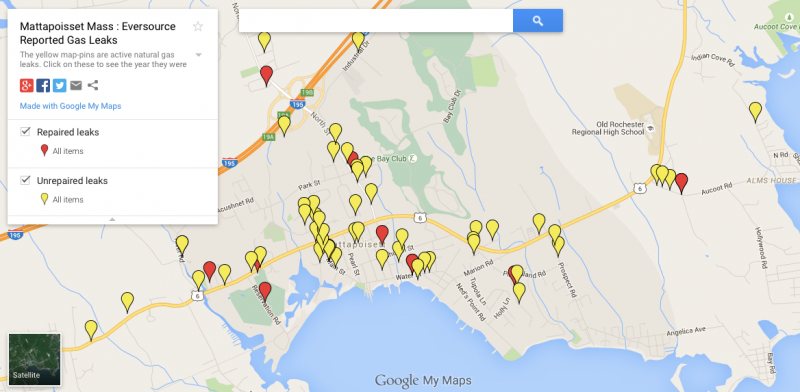Study reveals high number of gas leaks in Marion, Mattapoisett
Marion and Mattapoisett are among many towns in eastern Massachusetts with a high concentration of natural gas leaks, according to a report released by the Home Energy Efficiency Team (HEET).
While the leaks don’t pose an immediate threat to public safety in the tri-town, they are costing customers and the environment.
HEET, a nonprofit based in Cambridge, released its findings last week in “Reducing Gas Leaks in Massachusetts: An Action Manual.” The 15 page document highlighted the dangers of the leaks and mapped their locations in 180 cities and towns.
Maps of the leaks were available for the first time following the passage of a state law. The law requires utility companies to release the age and location of gas leaks.
In Marion, there are 32 unrepaired leaks with the oldest leak dating back to 2013. Mattapoisett has 51 unrepaired leaks, and the oldest one dates to 2014. All of the unrepaired leaks are classified as Grade 3 leaks, which are categorized as non-hazardous and can be reasonably expected to remain non-hazardous.
There are 2,300 Eversource gas customers in Marion and Mattapoisett combined.
According to information from Eversource, the more dangerous Grade 2 and Grade 1 leaks were identified and repaired last year, usually on the same day of receiving notification. In Marion, six Grade 1 leaks were identified and repaired on the same day. Five Grade 2 leaks were identified and repaired, generally a few days after being identified.
While the tri-town’s remaining leaks don’t pose a huge safety threat, the combined leaks across the state are costing ratepayers and the environment, said Audrey Schulman, president of HEET.
“We’re all paying for this wasted gas,” Schulman said. “Just as importantly, each one is causing damage in other ways. It kills trees by the roots, and it’s also an incredibly damaging greenhouse gas.”
According to one calculation, Schulman said the leaks make up 10 percent of the state’s greenhouse gas emissions.
To remedy that, Schulman said bills have been introduced by state Sen. James Eldridge (D-Acton) that would protect gas customers from paying for leaked gas and require companies to repair gas leaks during certain road projects.
In response to the new law, Eversource spokesman Michael Durand said the utility companies are striving to upgrade gas infrastructure.
“The significance of the new gas infrastructure law in Massachusetts cannot be overstated,” Durand said. “It creates an accelerated infrastructure replacement program that requires gas companies to replace aging, leak-prone pipe at a faster pace.”
Also, the law has increased the rate of pipe repairs.
“This law is facilitating our replacement program by allowing for more efficient scheduling and promoting greater cost-effectiveness,” he said.
In the future, Schulman said HEET hopes to map other cities and towns in Massachusetts, but it needs money and manpower to finish the job. For more information on HEET, visit www.heetma.org.















